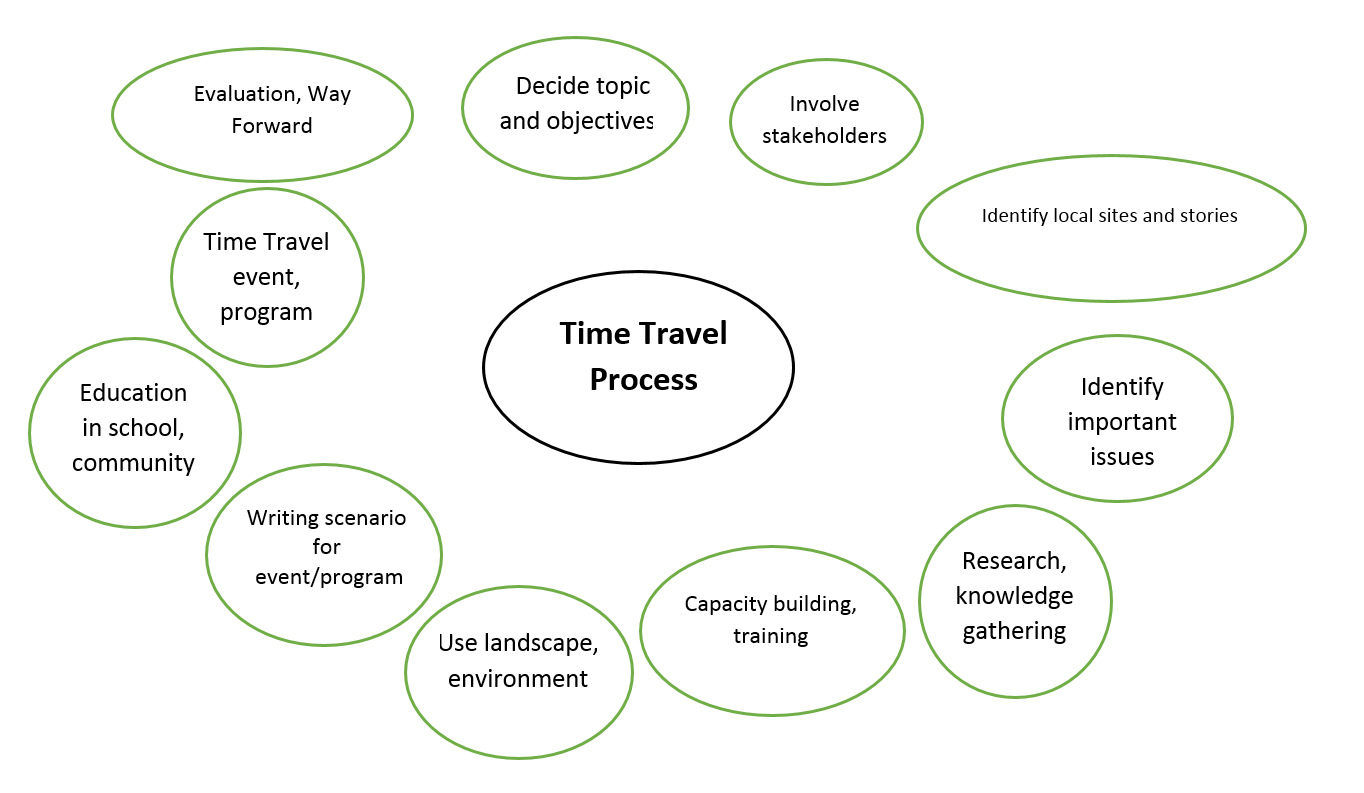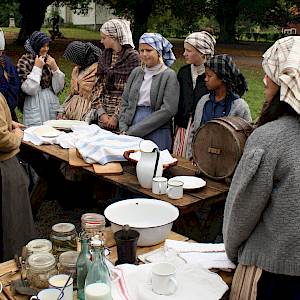The Time Travel Method
Definition
The Time Travel Method
is an educational method,
using local heritage in a learning process,
to create reflection on contemporary issues,
and provide tools for community building
Goal
The goal is to promote learning, social cohesion and contribute to community building
Aim
The aim is to create community groups and support education in schools, as platforms for learning, dialogue and reflection, using local heritage. This comprises continued processes and events. Objectives, see Bridging Ages action plan
The 5 principles of the Time Travel method
- The use of local sites and stories
- Key questions, connecting contemporary issues with the past
- Working together, several partners
- Different perspectives of today and the past, mainly bottom-up approach
- Reflective dialogue in the process and in the event
Each principle needs explanations
The Time Travel Process and the Time Travel Event
The Time Travel process is the common engagement of people, using local heritage as a platform for learning and dialogue in the community. Several components are utilized in the process.
In the Time Travel event the participants engage in a story at a local historical site to create reflection on a contemporary issue, and generate plans for the future.
Target groups are local communities and schools.
The Time Travel Process
The Time Travel process is the meeting and active engagement between different groups of people and organizations in the community, using the local heritage, sites and stories, for education in schools, community building and social cohesion. Most often it is utilized to prepare for a Time Travel event. Organizations outside of the community/ school often support and coordinate.
The Time Travel process consists of several components, that could be used in sequence, combined or separate. Following components are recognized:

The Time Travel event
Goal/ objectives, key questions and learning
- The Time Travel is a role-play/ dramatization of an historical event, to create reflection on a contemporary issue, staged at a local site within the community.
- The overall goal is to promote learning, social cohesion and contribute to community building using local heritage. Every Time Travel event has a specific objective, when schools are involved the objective is connected to the curriculum.
- The topic explains the focus of the event, an important issue of today and of the past. The key questions formulate these issues, to be discussed in the dialogue of the event from different perspectives, in order to find common solutions.
- The pedagogy is based on a relational and experiential learning process, reflective dialogue, and using of the whole brain.
Scenario
- Before the event a scenario is written, a fictional story, a certain year, a special event at a local site. The scenario is based on facts, and is structured with objectives, topic, story, roles, key questions, activities and time-plan. The scenario opens for conflicting views, a problem to solve, preferably with alternative solutions.
Preparations, implementation and evaluation
- The participants are prepared in the community group and in the school(s). They might have chosen a character of their own, keeping their age and sex.
- Each Time Travel event has a leader for the whole event and a leader for each activity. Everybody is actively participating in the event, there is no audience.
- Learning areas/ safe spaces are created, where every person can express their views, listen, reflect, discuss and come up with solutions, while working with their hands at the same time.
- The Time Travel event is a drama with a considered dramaturgy, in the beginning, in the middle and in the end, in order to increase the learning and reflection process.
- The Time Travel event is always followed by an evaluation, to find out about the learning that has taken place, if the goals have been achieved and compare the key questions/ topic with today.
Based on the discussions at the Bridging Ages Expert Seminar in Pretoria, South Africa, 29-31 March 2016
Rueben Gounden:
Experiential learning is a method of educating through first-hand experience. Skills, knowledge, and experience are acquired outside of the traditional academic classroom setting, and may include internships, studies abroad, field trips, field research, and service-learning projects.
Relational learning is a way of being with learners, teachers, lecturers from different backgrounds who learn from each other through the sharing of ideas and together create learning. Relational learning involves dialogue about learning. The relational learning process leans itself to the active process of co-constructing knowledge not only in the classroom but outside as well.
Time Travel encompasses the above two learning processes.




